More experts, fewer conspiracy theorists on active travel TV shows please

Flicking through the TV channels the other evening, I happened across one of those shows based on real-life footage of how police deal with law-breaking drivers, and couldn’t help thinking there was something missing.
One segment of the programme showed traffic police at an operation in London pulling over hundreds of drivers after automatic number plate recognition (ANPR) flagged up issues such as the vehicle being uninsured.
But where was the representative of an opaquely-funded lobby group to confidently inform us that more motorists would buy cover for their vehicles if only the government scrapped insurance premium tax?
And where were the minor celebrities turned conspiracy theory enthusiasts to tell us that deploying technology such as ANPR cameras was linked to the increasingly severe restrictions being placed on the mass population by a global elite hell-bent on controlling every aspect of our lives?
None of the those appeared on the episode of the Channel 5 show Criminals: Caught on Camera, which instead gave a voice to the police officers and civilian staff whose daily job is trying to ensure that our roads are safe, and that law-breaking drivers are brought to justice.
Trying to introduce a contrasting point of view within the context of that programme would quite rightly be considered outrageous.
Yet it’s something that the BBC regularly does when it covers issues such as the danger drivers pose to cyclists on Britain’s roads or, as we saw on Monday evening in the latest episode of the broadcaster’s flagship current affairs programme Panorama, low traffic neighbourhoods (LTNs).
Aired under the sensationalist title Road Wars: Neighbourhood Traffic Chaos, the programme looked at LTNs in several London boroughs, as well as in Oxford, where the concept of the 15-minute city was also addressed.
Presenter Justin Rowlatt – whom you may remember from a highly criticised 2021 BBC News report looking at LTNs in Chiswick, west London – did seem sympathetic to local residents in Oxford who were seeking to prevent drivers from cutting through an LTN where the bollard was continually damaged, stolen and even set on fire. ‘
> “Shameful” – BBC “perpetuated falsehoods” in divisive low traffic neighbourhood report
He also appeared to struggle to suspend his disbelief at the owner of a scaffolding firm in Camden, north London, who had a stack of fines – none of which he had the slightest intention of paying – issued to his drivers for ignoring restrictions relating to the LTN in which the business is based.
One widely criticised aspect of the BBC’s news and current affairs output is that in its aim to be impartial and achieve ‘balance’ actually ends up magnifying fringe views or perpetuating myths that are easily disproven with data-based evidence.
That includes, in this case, claims that LTNs simply displace traffic to surrounding streets, and that they lead to mass closures of businesses when study after study shows that restricting motor vehicles helps local economies thrive.
We also had a representative of the Taxpayers’ Alliance – a right-wing lobby group based at 55 Tufton Street and which is often portrayed by the BBC as being concerned about the impact of government spending on ordinary people, rather than being driven by its own agenda – claiming that fines imposed by councils on law-breaking drivers are “cash cows,” a charge refuted by the Local Government Association.
The programme also dwelt on coverage of a recent protest in Oxford that besides local residents with perhaps legitimate concerns over the council’s plans, also saw conspiracy theorists descend on the city, protesting about what they see as a globalist plan to restrict people’s movements through the introduction of 15-minute cities.
That segment was prefaced by footage from social media of Katie Hopkins alleging that such schemes were similar to lockdowns introduced during the COVID-19 pandemic, and aim to curb the freedom of people to move around as they wished, something also claimed by the former actor Laurence Fox who attended the Oxford protest.
That’s absolute claptrap, of course, but is a claim being pushed forward by a number of disparate groups some of which are also opposed to lockdowns and vaccines, as well as 5G mobile phone networks, and who have now turned their attention to efforts to reduce air pollution and traffic congestion, while promoting active travel.
The danger inherent in the BBC’s approach of trying to present two sides to an argument when in fact science and data points firmly in one direction – see for example the late Lord Lawson, well-known for his denial of climate change, regularly being invited to provide ‘balance’ on the subject whenever it cropped up in the news – is that it not only risks legitimising such views, but also magnifies them and helps them spread further.
Michael Gove may have said in the run-up to that referendum that “People in this country have had enough of experts” – well, we all know how well that turned out.
Me, I’d rather hear more from experts on this kind of programme rather than the misinformed claims of a small but shouty minority in the interests of reflecting both sides of an argument – after all, it’s not as though in the interests of balance, the makers of 999: Criminals Caught on Camera feel the need to canvas the opinions of pressure groups claiming to represent people who drive while drunk or drugged, or those who take vehicles without the owner’s consent, is it?


